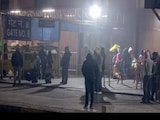Slamming the Morbi civic body for "acting smart", the Gujarat High Court today sought direct answers and slammed the manner in which the contract was awarded for maintenance of a 150-year-old bridge that collapsed on October 30 killing over 130 people.
"The municipality, a government body, has defaulted, which ultimately killed 135 people," the court said as a preliminary observation. As the municipality was not represented by any officials today despite a notice, the bench remarked, "They are acting smart."
It pointedly asked officials to come back with details on whether any condition for certifying fitness of the bridge before its reopening was part the agreement, and who the person responsible was.
"The state shall also place on record reasons why disciplinary proceedings against chief officer of the civic body aren't commenced," it said.
"The largesse of the state seems to have been granted without there being any tender floated in this regard," its order noted.
"Why was the tender for the repair work of a public bridge not floated? Why weren't bids invited?" Chief Justice Aravind Kumar said to the Chief Secretary, the state's top bureaucrat, at the opening hearing of the case that will be heard on Wednesday too.
The Morbi municipality had given the 15-year contract to Oreva Group, which is best known for the Ajanta brand of wall clocks.
"How was an agreement for such an important work completed in just one and a half pages?" the Chief Justice said. "Was the largesse of the state given to Ajanta company without any tender being floated?" the court further observed.
It asked for the basis on which the bridge was being operated by the company after June 2017 "even when [the contract signed in 2008] was not renewed". A new agreement was signed this year.
The court had taken note of the tragedy on its own and sought replies from at least six departments. Chief Justice Aravind Kumar and Justice Ashutosh J Shastri are hearing the matter.
So far, only some staff of the contracted company have been arrested, while the top management, which signed the Rs 7-crore pact, has not faced action, nor have any officers been held accountable for the bridge having been reopened ahead of the renovation schedule.
It is alleged that the company did not replace the rusted cables but installed a new flooring that proved too heavy.
The court asked for files of the contract from the first day to be submitted in a sealed envelope.
The government has submitted that it worked at "lightning speed" and saved many lives. "Nine people have been arrested, and if anybody else is found to be guilty, we'll definitely book them," a government lawyer said. It submitted that monetary compensation has been give too: The state announced Rs 4 lakh to families of the dead and Rs 50,000 for the injured. Prime Minister Narendra Modi, who visited the disaster site in his home state, announced Rs 2 lakh each from the central government for families of the dead.
In the order today, the court directed the Principal District Judge of Morbi to appoint a bailiff to a notice to the civic body. It noted that, though the state has filed an affidavit, some clarifications were needed about the contract.
"The list of chronological events would indicate that MoU (Memorandum of Understanding) was signed on June 16, 2008, between Collector and the contractor," it noted.
"This [contract] was to operate, maintain, manage and collect rent in respect of the suspension bridge. The said period expired on June 15, 2017. Thus the moot question would be: Under this MoU, who had been fixed the responsibility to certify the fitness of bridge... After the term was over in 2017, what steps were taken by Morbi civic body and the Collector thereafter to float a tender?" the court said.
Rights panel is probing too
While the state government has set up a five-member inquiry committee to look into lapses, the Gujarat State Human Rights Commission informed the court today that its chairperson and a member are probing the ramifications of the tragedy.
The commission is also verifying if the compensation is being is paid properly to the families.
The court sought to further know from the state if it could provide jobs to family members of victims who were sole earners.















